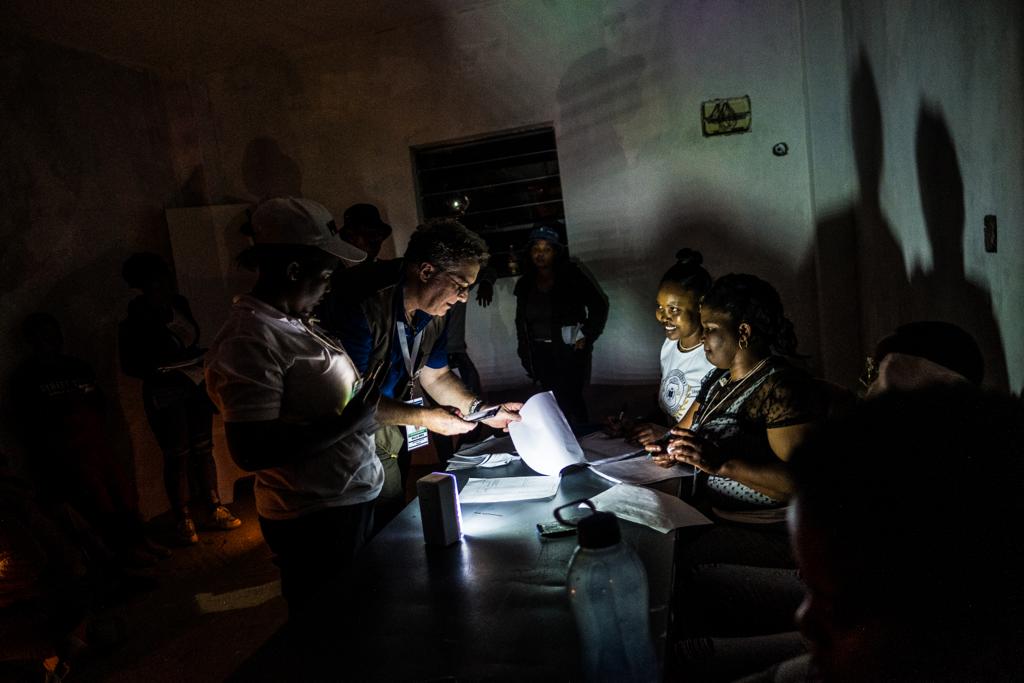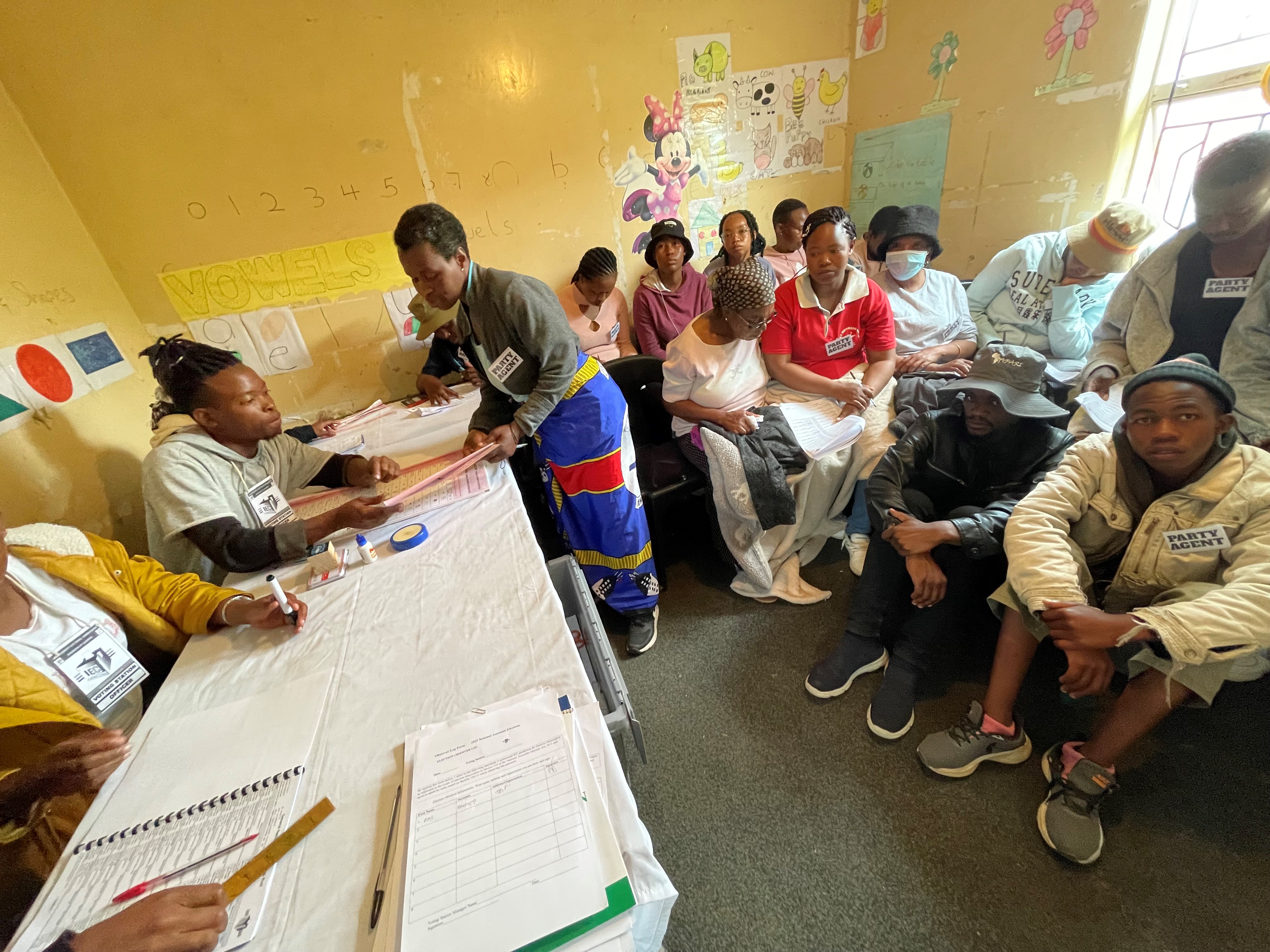News
Here's why Lesotho's Political Establishment has been Dumped
Elections have tossed out governments and been a catalyst for coalitions. They have also been a means of expressing people's disquiet on growing corruption, and an opportunity to extort something from politicians every five years. But until now, all the political games have made little improvement to the lives of the average Basotho.

"The problem is gangsterism,” replied the officer, as he tried to get prisoners who, wearing a combination of red overalls and stitched-together rags, were to stand in line to vote at Mohale Hoek's prison. I had asked him why Lesotho had the world's third highest murder rate, after El Salvador and Jamaica. 'It's very, very high,' he admitted, shepherding lines of the 426 inmates towards the carefully ordered process.
Security, corruption and jobs were the three main issues highlighted by politicians in preparation for Lesotho's election on 7 October, the seventh ballot since the reinstatement of democracy in 1993. But whether this makes any difference to the mountain kingdom's economic trajectory is questionable. Politics is supposed to be the means to provide a policy and governance platform for growth and development. Not so in Lesotho, as in much of southern Africa. Rather it's been about the redistribution of wealth to parties indistinguishable by their policies, if not their promises, and defined by their personalities.
Unsurprisingly, as the results trickled in the day after the election, the country's established political parties were decisively defeated by the new Revolution For Prosperity party and its leader, Lesotho's leading businessman, Sam Matekane.
But this is not the first time that Lesotho's voters have thrown their weight solidly behind one party.
Lesotho has also seen four military coups since independence from Britain in 1966, as well as several failed mutinies and an “election coup” in 1970 when the results were overturned by the incumbent. On that occasion Chief Leabua Jonathan declared a state of emergency, annulled the election, dissolved Parliament and suspended the constitution, dispatching the critical King Moshoeshoe II into exile. Jonathan was removed, in turn, in a South African-engineered military coup in December 1985.
After eight years of military rule, in 1993, a new constitution was implemented. The Basutoland Congress Party (BCP) headed by Ntsu Mokhehle, which had unofficially won the 1970 election, won every seat in the Parliament. A palace coup followed in 1994, which temporarily centred power on the King, and another in 1997, both of which fizzled.
In 1997, Mokhehle abandoned the BCP, establishing the Lesotho Congress for Democracy. The BCP became the opposition. The LCD won election in 1998, cleaning up with all bar one seat in the 80-seat Parliament. Allegations of electoral fraud followed, culminating in violent demonstrations, followed by another army mutiny which was bloodily put down by a rather ham-fisted SADC task force. An Interim Political Authority was created in December 1998, devising a proportional electoral system to ensure that there be opposition in the National Assembly, with 80 seats elected via constituencies and 40 filled on a proportional basis.
New elections under this dispensation were held in May 2002. The LCD won again with 54% of the vote. In October 2006, Tom Thabane left the LCD to form the All Basotho Convention (ABC), though the LCD still won a majority in the February 2007 election. Before the 2012 election, Prime Minister Pakalitha Mosisili left his own party to form the Democratic Congress. The DC won the 2012 election, though Thabane formed a coalition and took over as prime minister.
If you are still following this game of political musical chairs, it gets even more interesting.
In June 2014, Thabane suspended Parliament because of conflict within his increasingly fractious coalition. He then fled the country that August alleging a coup was taking place, the army head later being accused of ordering the murder of his successor. Mosisili then returned to office in the February 2015 general election. In November 2016 an agreement was announced between the deputy leader of the Democratic Congress, Monyane Moleleki, and Thabane to install Moleleki as prime minister. Although Moleleki was suspended from the Democratic Congress, this new alliance defeated Mosisili in a vote of no confidence on 1 March 2017. Thabane won the following election, though he was later forced to resign after a scandal involving the murder of his wife, with finance minister Dr Moeketsi Majoro taking over in 2020. Divisions were then created as a result of a split from the ruling ABC in 2021, weakening an already shaky coalition.
Then, in 2022, just six months before voting, Matekane started the Revolution for Prosperity (RFP) with which to contest the election.
Elections have tossed out governments and been a catalyst for coalitions. They have also been a means of expressing people's disquiet on growing corruption, and an opportunity to extort something from politicians every five years. But until now, all the political games have made little improvement to the lives of the average Basotho.
It's become a competition between personalities and their promises. Party manifestos are routinely a laundry list of unfunded (and apparently unfundable) projects, with subsequent governments apparently wholly incapable of delivery.
In the mountain kingdom the political struggles are so bitter not because the stakes are so low, but because there are so few opportunities outside of the political theatre for making money.
This explains why there were 65 political parties contesting the 7 October election, and why the civil service wage bill, at 20% of GDP, is unbearably large, or why at a more mundane level, its over inflated 38 ministers are entitled to two cars, a 4X4 and an upmarket German luxury sedan.
And yet Lesotho's GDP per capita is just $1,035, five times less than the SA mark, and 50% less than the continental average. One third of its 2.1 million people live in poverty. A breakdown in governance — the rule of law — alongside low growth and high inequality lends itself to violence. Lesotho's murder rate is 44 per 100,000, compared to South Africa's already insufferably high 33/100,000.
The politicking has little changed the direction of Lesotho's economy, which continues to decline, in part because it has not been able to diversify away from its principal sources of income: revenue from the Southern African Customs Union (Sacu), about 40% of government income; remittances from workers in South Africa; water sales to South Africa; and the textile and apparel sector. These sources are taking strain — the Sacu and SA revenue streams diminishing due to the state of the SA economy; textile exports being hammered as US demand dries up, and the industry shrinking from more than 50,000 workers to around 30,000.
The more relevant question is why has politics made so little difference? Why is it that the government rolls out five-yearly National Strategic Development Plans against which it never delivers? And why are things apparently getting worse?

The reasons appear to be threefold but interlinked. First, whatever challenges Lesotho had before, they have been amplified by 60 years of sustained population growth, during which time it has more than doubled. This would not be a problem, say, in Singapore, but this coterie has been fed into a low skills, low growth market. Second, the differential in income with South Africa, which entirely surrounds the kingdom, is illustrative of the extent of the frictional costs — in terms of bureaucracy and logistics in particular — between the two.
And third, and most importantly, Lesotho has never had to develop its own development path replete with hard choices and ownership of its destiny. There has always been a soft, diplomatically-directed option: donor funding especially during the apartheid years, unfettered access to the European and US markets, and Sacu revenue.
The diplomatic empathy still exists, and is good for some things. For instance, that the EU sent an 87-member election observation mission now to Lesotho is evidence of the concern over the country's direction. Special access to the US market still exists under the African Growth and Opportunity Act. But more is required.
As one Basotho leader remarked, “It's time for the government to stop playing games.”
There is little doubt that capacity exists to do so. The way the 7 October election was run, and the professionalism and efficiency of the polling stations that we observed, were heartening. The process was orderly and transparent; the observers and staff alike courteous and patient.
What the country needs is direction. Leadership which prioritises and exemplifies sacrifice would be a good start. A streamlined cabinet and slashing the perks of politicians is a good place to start, though this will not be easy since some will assume it's their turn to eat, and because the civil service is hyper politicised. Yet Lesotho is not a luxury Mercedes country; it's more of a frugal but reliable Kia economy.
“It's critical,” says King Letsie III, “to have a stable Parliament to anchor a stable executive to be able to focus to get out of the problems we are facing, which are many.”
The RFP will likely be at the helm of the new government, led by a man with obvious business successes and interests. A national prosperity agenda will require turning politics from simply being economics by other means to driving a national development plan aimed at growth rather than redistribution. If it doesn't change the act of politics in Lesotho, the RFP can only become another casualty of its ongoing political drama.
This article originally appeared on the Daily Maverick


